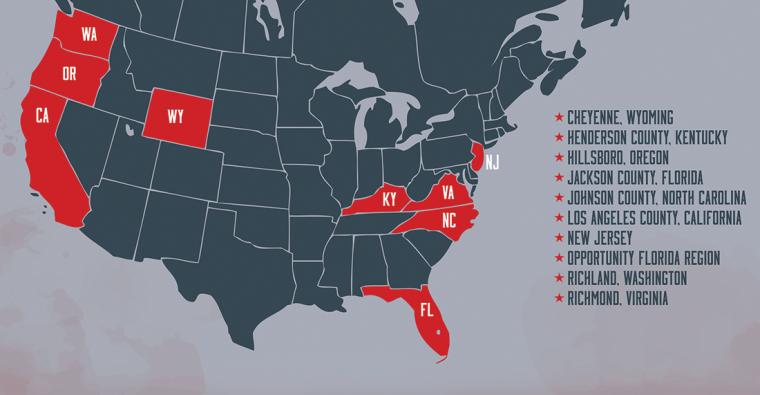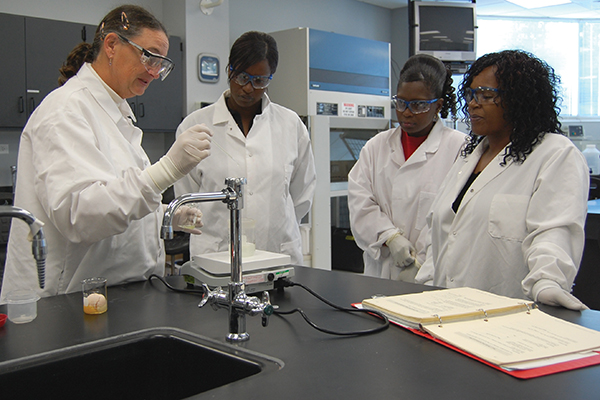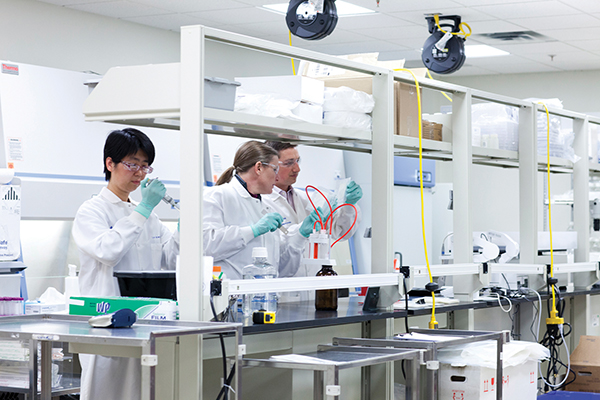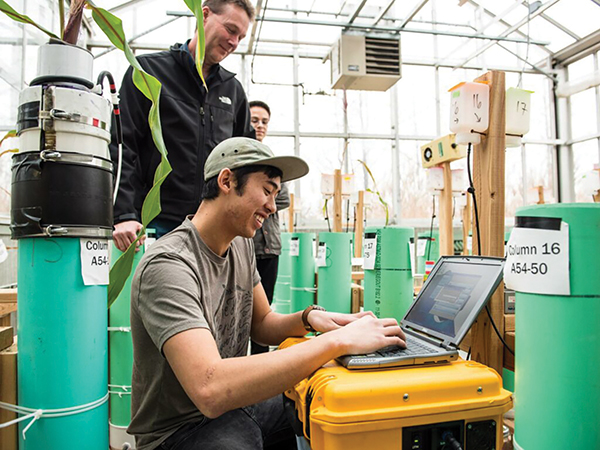
Today, human resources personnel in most companies, but especially high-tech companies, are finding that hiring is one of their biggest challenges. Older workers are retiring, taking all their skills and expertise with them. At the same time, technological change has led to new demands for skilled labor.
In order to bridge the gap between jobseekers’ skills and the increasingly complex hiring needs of companies, states, counties and localities are forging workforce training programs designed to better educate their workforce to be ready for today’s jobs.
In this article, Trade & Industry Development is highlighting a number of regions around the country that offer workforce training and education resources that are a match for both employers and jobseekers.
Cheyenne, Wyoming

In Cheyenne, Wyoming’s capital, workforce development is a key component of the city’s growth strategy. While several institutions lead the charge, organizations like Cheyenne LEADS play an essential supporting role, working closely with local partners to advance training initiatives.
One of Cheyenne’s most influential training providers is Laramie County Community College (LCCC), which offers a range of programs in sectors such as healthcare, information technology and advanced manufacturing. LCCC works directly with businesses and industry leaders to ensure their programs align with local labor market needs. By tailoring these programs to industry demands, LCCC helps prepare residents for the jobs of today and tomorrow.
Cheyenne LEADS complements these efforts by fostering connections between businesses and workforce training providers. LEADS actively promotes the use of the Wyoming Workforce Development Training Fund (WDTF), which offers financial support for businesses to upskill their employees. This collaboration ensures that businesses have access to well-trained workers and the resources they need to remain competitive.
Additionally, through programs like Wyoming Works, Cheyenne LEADS helps raise awareness of opportunities for students to pursue certifications in high-demand fields. While not the primary driver of training programs, Cheyenne LEADS strengthens the region’s workforce ecosystem, helping position Cheyenne as a key player in Wyoming’s economic development by promoting collaboration and investment in workforce readiness. This collaborative approach ensures a sustainable future for Cheyenne. For more information, visit cheyenneleads.org.
Henderson County, Kentucky

Henderson County, Kentucky has an innovative program that links birthday cakes and the future workforce. Local manufacturers in Henderson County have discovered a powerful way to make an impact — by providing every elementary school child a birthday cake and books. The gesture not only spreads joy but also introduces families to career opportunities in manufacturing, creating a ripple effect that could shape the future workforce for years to come. This initiative is just one example of how local manufacturers in Henderson County are shaping the workforce, with other meaningful efforts focused directly on education and training.
Another workforce initiative is Henderson Economic Development’s Manufacturing Academy, a series of daylong events that offer Henderson County Schools students and administrators real-world experiences in manufacturing facilities. Several local industries open their doors to middle and high school students, educators and faculty, showcasing that modern manufacturing isn’t the stereotypical job people expect. The eye-opening experience aims to change perceptions and inspire future careers.
Local manufacturers are also working closely with educators. Henderson County High School’s Career and Technical Education (CTE) program and Henderson Community College (HCC) are continually evolving to meet industry needs. HCC’s Federation for Advanced Manufacturing Education (FAME) program offers a unique work-and-learn opportunity, while HCHS provides hands-on training in welding, machine tool technology and industrial maintenance, ensuring that students gain the skills needed for success in today’s high-tech manufacturing world. For more information, visit hendersonkyedc.com.
Hillsboro, Oregon

Since 2017, the Advanced Manufacturing Training and Education Coalition of Hillsboro (AM-TECH) has brought together industry, education and government partners to collectively address the current and future workforce needs for employers in the Silicon Forest.
An industry-led coalition, AM-TECH supports high-growth, high-demand workforce needs to maintain and grow a skilled and diverse workforce. The coalition supports workforce programming for youth and historically marginalized community members. Through a collective strategy, AM-TECH has implemented two key initiatives, Oregon’s first registered Advanced Manufacturing Youth Apprenticeship program at the Hillsboro School District, and Intel’s QuickStart program at Portland Community College.
The Advanced Manufacturing Youth Apprenticeship is an innovative, two-year program that provides a pathway for high school students, ages 16-18, to receive hands-on, paid training that prepares them for a career in advanced manufacturing while providing employers with an expanded and diversified skilled workforce. Students in various pathway programs can enroll in this program and graduate with a state-recognized industry credential.
The Quick Start Semiconductor Technician Training program is a 10-day training course designed to help job seekers quickly gain the skills they need to land an entry-level technician job with Intel and other area semiconductor manufacturers. The program prioritizes recruiting and training historically underrepresented populations in the industry, including women, people of color, veterans, people with disabilities and people from low-income and rural communities. For more information, visit www.hillsboro-oregon.gov.
Jackson County, Florida

According to research by the Jackson County Economic Development Committee, only approximately half of high school graduates are enrolling in any kind of postsecondary training across NW Florida. This is concerning, since nearly 75 percent of the high-wage jobs require some type of postsecondary credential. Although the region has experienced a significant uptick in CTE enrollments, it is clear that more can and should be done to demonstrate workforce needs and clarify the value of the career paths available — particularly in the construction, transportation and manufacturing high-skill technical occupations.
In Jackson County, multiple agencies are working closely together to devise plans and approaches to creating a better pipeline of workforce talent. Of course, this has national attention at the U.S. Chamber of Commerce Foundation, where a team has been conducting The Talent Pipeline Management Academy (tpmacademy.org) focused on bolstering effective alignment and demand-driven pipelines.
The Jackson County Economic Development Committee is involved in connecting and serving the workforce and economic community in NW Florida. Chipola College offers 13 workforce programs, and CareerSource Chipola partners with the region’s businesses and schools to not only provide funding for tuition but offer a curriculum to penetrate the high schools and support the students in terms of evaluating their tendencies and skills inclinations, as well as inform them of the training and jobs available to them in the region. For more information, visit www.jacksonedc.com.
Johnston County, North Carolina

Complementing Johnston County North Carolina’s geography and hard assets is a fast-growing population with access to skill-building resources most business destinations can’t match. Good solid leadership has created what many believe is their greatest economic asset: their people. Talent drives today’s location choices, and Johnston County has stayed ahead with innovative solutions to keep the workforce on the cutting edge.
County leaders anticipated the need for workforce development more than two decades ago when local elected officials joined training experts at Johnston Community College and economic development leaders in building the 30,000-square-foot Biotechnology Workforce Development Center. This state-of-the-art facility has been the crown jewel of the talent transformation strategy in the region, especially with regard to the growth of bio-manufacturers Grifols Therapeutics and insulin maker Novo Nordisk. The companies have donated most of the training equipment, making the classroom identical to what students will encounter when they move to the production floor. As a result, the Center is preparing jobseekers for life science careers in a matter of weeks.
The Workforce Center also whets the appetites of middle school and high school students for life science careers, with outreach programs that get kids, parents and teachers thinking about the educational ingredients for bio-pharma success. However, the county’s talent pipeline strategy doesn’t stop there. Through “JoCo Works,” workforce leaders collaborate with public schools and Chambers of Commerce to connect students with viable career options across the manufacturing spectrum. The outreach begins as early as eighth grade and continues to students’ senior years in high school. For more information, visit www.growwithjoco.com.
Los Angeles County, California

The Los Angeles County Economic Development Corporation (LAEDC) continues to make notable progress in building a more equitable, sustainable and resilient economy across LA County. Using its comprehensive five-pillar economic development strategy — which includes economic research, industry cluster development, business assistance, international trade and workforce development — alongside strong public-private partnerships, the LAEDC aims to maximize its impact.
The LAEDC Industry Cluster Program is a targeted initiative to enhance LA County’s economy by fostering job creation and providing opportunities for underserved communities. By developing key industry sectors, the organization strives to establish sustainable employment opportunities, particularly for marginalized groups. The program leverages a collaborative approach, engaging regional stakeholders to boost industry competitiveness and growth. By focusing on high-priority sectors, the program promotes innovation, job creation and sustainable economic development.
Through an initiative called the E3 Strategy: Engage, Empower, Elevate, LAEDC has formed strategic partnerships to further its workforce development mission. This framework aims to create a transformative and inclusive environment, preparing the next generation for the workforce and supporting their personal and professional development. This generates a positive ripple effect throughout the community, fostering a skilled workforce across LA County.
As a 501(c)(3) organization, LAEDC has served all of LA County for over 40 years with a mission of reinventing the region’s economy to collaboratively advance growth and prosperity for all. For more information about the LAEDC, visit www.laedc.org
New Jersey

New Jersey shines as a premier destination for businesses in biopharmaceuticals, manufacturing, technology and more, thanks to an exceptional combination of assets. Its unparalleled connectivity includes the busiest airport system in the United States, extensive public transit and the largest port on the East Coast. The state’s $16 billion Gateway Program will further enhance connectivity with new tunnels to New York City. New Jersey’s strategic location and top-tier infrastructure have attracted the 2026 FIFA World Cup Final and Netflix’s newest production facility. Gilead Sciences selected the state for its robust biopharma ecosystem, commitment to sustainability and access to a highly educated workforce. New Jersey’s most prized asset is its talent pool.
New Jersey’s robust talent pipeline is supported by its top-ranked public school system, top-tier institutions like Princeton University and the New Jersey Institute of Technology, and community colleges focused on middle-skilled opportunities. The state’s higher education training programs enable businesses in key industries to access skilled talent while promoting job growth and economic advancement. The Raritan Valley Community College Workforce Training Center fosters talent and infrastructure to advance the development of cell and gene therapies, the County College of Morris Workforce Programs include an advanced manufacturing center, and the Career and Technical Education at Rowan College of South Jersey offers the hands-on training in welding needed for the growing offshore wind industry. Additionally, the New Jersey Department of Labor offers funding opportunities to support workforce development. New Jersey’s economic support extends to its innovation hubs, film industry incentives and green infrastructure tax credits.
With vibrant communities, diverse cultural experiences and a commitment to inclusion, New Jersey is the ideal location for businesses and families. For more information, visit www.choosenj.com.
Opportunity Florida Region

The Opportunity Florida region offers businesses a workforce of more than 123,000 strong. In the region, the needs of local businesses and industries help guide and define career training options. The area’s nine community colleges, technical schools and more than 120 high school career academies provide a regional training pipeline of ready-to-work talent. High school training academies prepare students for careers aligned with local economic needs.
Community colleges and technical schools offer associate degrees and certifications in auto and diesel mechanics, building tech, engineering tech, robotics, welding, CDL training and more as the region continues to grow a skilled labor pool across 10 counties. Universities offer four-year and graduate degrees, including engineering and research studies.
Employee Training Grants through CareerSource – one of the state’s highest-performing workforce organizations – connect businesses with qualified employees at no cost. From centers across the state, CareerSource ensures employers can access the best available people and training to help employees increase their earning potential by providing access to marketable skills.
With a strong labor draw from NW Florida and Southern Alabama, workforce and training resources are available to meet employment needs in the northwest Florida Rural Area of Opportunity known as Opportunity Florida. Call 850-633-4119 or visit www.opportunityflorida.com.
Richland, Washington

Richland, Washington is at a pivotal moment of growth, and workforce development is essential to sustaining its economic momentum. With expanding industries such as clean energy, technology and healthcare, equipping residents with the right skills is critical for the city’s long-term prosperity. Workforce development programs, including vocational training, apprenticeships and continuous education, ensure that residents are ready to fill high-demand jobs.
The City of Richland is actively addressing this need through its Business License Reserve Fund grant, which provides scholarships for continuing education. In partnership with Visit Tri-Cities and WSU Tri-Cities Cougar Tracks, this grant aims to empower residents to enhance their skills and credentials. By providing financial support, the program makes continuing education more accessible, ensuring that more individuals can benefit from advanced training and career advancement opportunities.
Other local institutions, such as Columbia Basin College, are already working to align educational offerings with industry needs. Quarterly, the community comes together with education and industry to identify needs and anticipated job growth to prepare training courses and offerings.
As Richland continues to grow, these strategic investments in workforce development will shape its future success. By fostering a highly skilled and adaptable workforce, the city is not only reducing unemployment, currently one of the lowest in the state, but also positioning itself as a competitive hub for innovation and industry growth in the Tri-Cities region. For more information, visit www.richlandbusiness.com.
Richmond, Virginia

Record-low national unemployment has companies wondering how to fill their workforce pipelines. Employees seeking a better work-life balance in affordable communities have shifted the tide from a company-first mindset. Mid-sized metros that offer affordability with big-city amenities are on the rise. As an example, Greater Richmond, Virginia gains 182 net new residents every week, making it Virginia’s fastest-growing community and the nation’s number 15 fastest-growing community by percentage.
However, population increases alone can’t solve the employment skills gap. The region’s workforce development programs are equally robust for companies seeking fresh talent and employees looking to reskill. The Virginia Talent Accelerator Program (VTAP) produces fully customizable training programs using virtual reality and more for clients like The LEGO Group and Owens & Minor. The region’s Community College Workforce Alliance, Manufacturing Skills Institute, Commonwealth Center for Advanced Manufacturing and Commonwealth Center for Advanced Logistics Systems also help train talent and resolve complex processes with bespoke solutions.
By fostering a strong talent pipeline with the help of more than 20 higher education institutions, Greater Richmond employers have the ability to partner with college-level programs. Academics at Virginia Commonwealth University, University of Richmond and others work hand-in-hand with employers to develop comprehensive degrees. And if Greater Richmond companies can’t find their ideal candidate, they can recruit one of the 1.67 million higher education students within 150 miles. For more information, visit www.grpva.com. T&ID
Related Agencies
- Cheyenne LEADS
- Henderson Economic Development
- Hillsboro Department of Economic Development
- Jackson County Economic Development Committee
- Johnston County Economic Development
- Los Angeles County Economic Development Corporation
- Choose New Jersey
- Opportunity Florida
- City of Richland - Office of Economic Development

